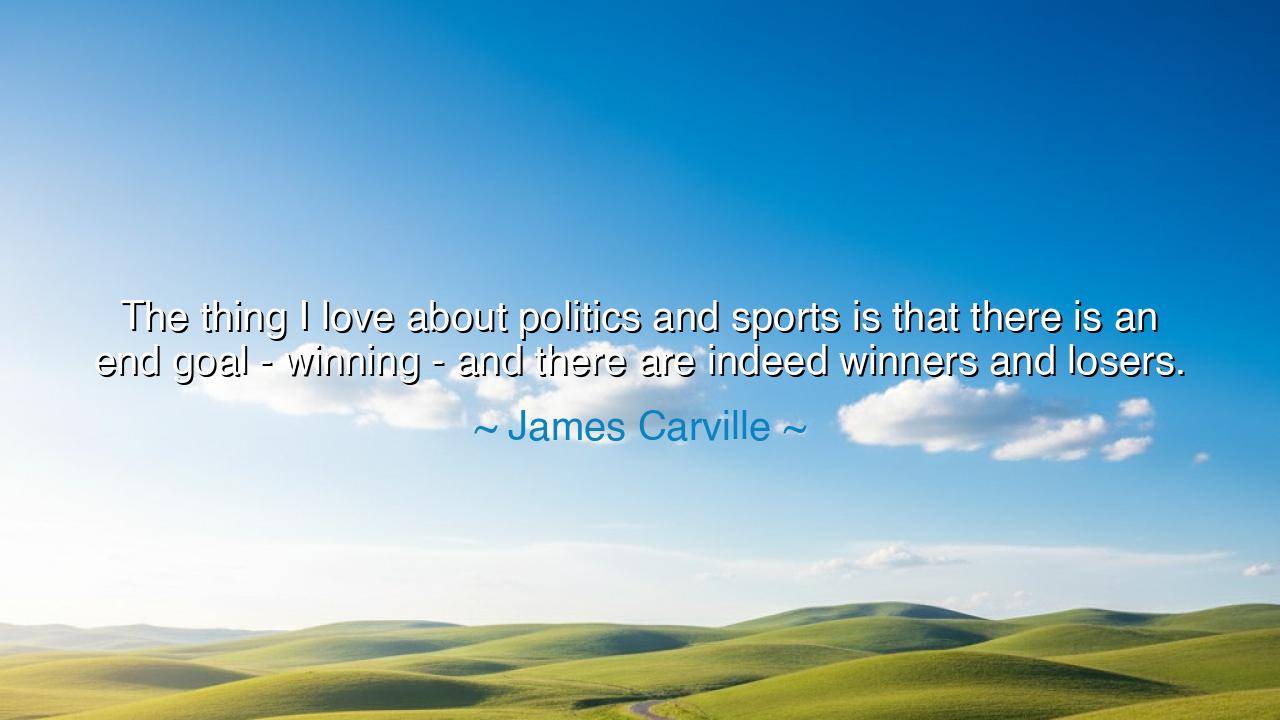
The thing I love about politics and sports is that there is an
The thing I love about politics and sports is that there is an end goal - winning - and there are indeed winners and losers.






The words of James Carville, “The thing I love about politics and sports is that there is an end goal – winning – and there are indeed winners and losers,” speak with the candor of a battlefield strategist. He reminds us that both politics and sports are not endless struggles without conclusion, but contests with clear outcomes. In them lies the clarity of conflict: there is striving, there is struggle, and at last, there is victory or defeat. This certainty sharpens the will, steels the spirit, and drives men to push beyond their limits.
The ancients honored this truth most vividly in their games and wars. In the Olympic arenas of Greece, athletes contended not for wealth, but for the wreath of victory, knowing only one could claim the prize. Likewise, in the Roman Senate, political contests often bore the same spirit: men rose or fell, their fates sealed by the will of the people or the decree of power. In both realms, as Carville notes, there is no endless ambiguity—there is a clear measure of who has prevailed.
History bears testimony in the rivalry between Abraham Lincoln and Stephen Douglas. Their debates were not endless speeches drifting into obscurity, but fierce contests for the heart of a nation. At last, one was chosen, the other rejected. It was the same in sports: when Jesse Owens ran in Berlin in 1936, there was no gray outcome—he stood victorious, disproving the poisonous myths of racial superiority. In both cases, the struggle ended with a crown for one, and silence for the other.
Yet Carville’s words also remind us of the cost of such contests. For where there are winners, there must also be losers. In sports, defeat may bring only sorrow of the heart, but in politics, it may shape the destiny of nations. To seek victory is noble only when the path is just; otherwise, triumph may be hollow, and defeat more honorable than a corrupt crown.
Let the generations remember: life often moves in shadows, but in politics and sports there lies a sharpness that clarifies the soul. The knowledge that one must win or lose calls forth courage, discipline, and resolve. It is this end goal, this certainty of outcome, that makes men strive with all their might. For though only one may wear the laurel wreath, the struggle itself—fierce, disciplined, and unrelenting—is the true forge of greatness.






KVkhanh Vy
I find this quote interesting because it highlights a competitive mindset, but I think there’s a risk in viewing politics as a game with clear winners and losers. What about the role of collaboration and negotiation? Can we truly make progress if we’re constantly focused on victory at the expense of finding common ground? Shouldn’t the goal in politics be to create solutions that benefit everyone, not just to ‘win’ over opponents?
THTr Huong
I can see how this perspective on politics is appealing—there’s something satisfying about knowing where you stand at the end of the day. But in politics, does the ‘winner’ always represent the true interests of the people? Could the focus on winning cause politicians to disregard compromise or cooperation, which might actually lead to better solutions? How do we define a win in politics if it’s not always clear who the true ‘winner’ is?
KNVo Khanh Ngan
This quote captures a competitive spirit that’s easy to understand, but I wonder if comparing politics to sports might be problematic. Sports are a defined, structured environment, while politics is messier and affects people’s lives in much more profound ways. Can the idea of winning and losing really apply to politics, where the stakes are often more ambiguous? Shouldn’t politics be about collaboration and progress, not just victory?
NNngoc nguyen
I get the appeal of having a clear end goal like ‘winning,’ but it also makes me think about how politics isn’t always as straightforward as sports. In politics, winning can sometimes mean compromising on values or engaging in questionable tactics. Does this simplicity of ‘winners and losers’ in politics oversimplify the complexity of real-world consequences? Is there a risk that viewing politics like a game leads to ignoring the nuances and real impacts of decisions?